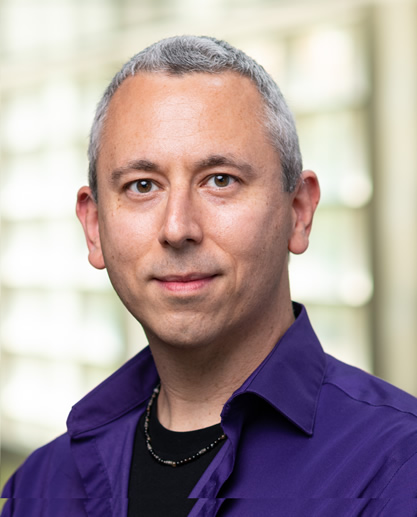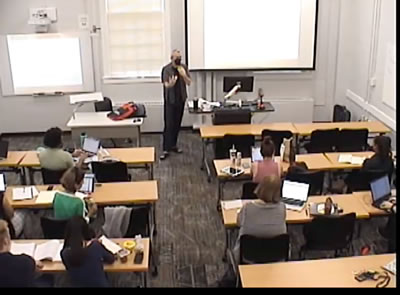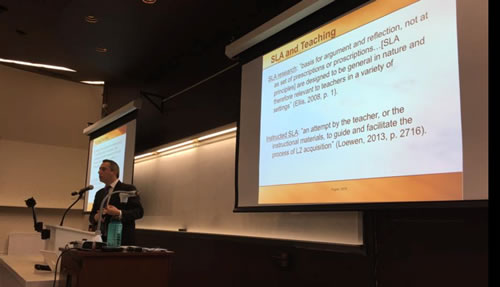Spotlight on the TESOL Teacher of the Year: Drew S. Fagan
Interview by Luan T. Nguyen
 Drew S. Fagan, EdD, is the 2023 TESOL Teacher of
the Year. Fagan is an associate clinical professor at the University of
Maryland, College Park, where he teaches applied linguistics and language
education. He also coordinates the TESOL Program at the university and serves
as associate director of the Multilingual Research Center. He holds an EdD in
TESOL from Teachers College, Columbia University; an MA in linguistics from San
Diego State University; and a BA in international relations and Spanish from
American University.
Drew S. Fagan, EdD, is the 2023 TESOL Teacher of
the Year. Fagan is an associate clinical professor at the University of
Maryland, College Park, where he teaches applied linguistics and language
education. He also coordinates the TESOL Program at the university and serves
as associate director of the Multilingual Research Center. He holds an EdD in
TESOL from Teachers College, Columbia University; an MA in linguistics from San
Diego State University; and a BA in international relations and Spanish from
American University.
He worked as a teacher, trainer, and educational
researcher in Tokyo, Japan; Madrid, Spain; Baja California, Mexico; and Wuhan,
China before becoming the first English Teaching Assistant Fulbright Fellow to
the Slovak Republic, teaching English and U.S. culture to university students
and researching language teaching method changes over the country’s
history. Read the press
release from TESOL.
Following, Luan T. Nguyen, chair-elect of the TESOL
Awards Professional Council, asks Dr. Fagan some questions to get to know him
and his work a bit better.
Congratulations on this important
award and outstanding achievement! What does being selected as the TESOL
Teacher of the Year mean to you academically, professionally, and
personally?
Thank you so much! I am humbled and honored to be
considered among such highly esteemed colleagues in our vast global field.
Being TESOL Teacher of the Year highlights my
life-long love of languages and learning about new cultures, as well as my
embrace of continued professional development. Educators are learners: when we
stop learning, we and the field become stagnant. When that happens, our
students suffer. After more than 20 years in the field, I continue taking
advantage of formal professional development opportunities. However, I also
learn vis-à-vis engagements with my students in real-time. Who are
they? Why are they here? What do they hope to gain from English as it relates
to their worlds outside of the formal learning context? What have been their
struggles with the educational system? I have evolved into being the educator I
am today as much through interactions with students as through any formal
workshop.
This is also the culmination of more than two
decades of working to ensure that anyone wanting to learn English for whatever
reason can do so in a way that interweaves their lived experiences with their
future goals. Our field has set out to ensure access to language learning is
available for everyone. Central to this is being cognizant of working with
different populations of students, families, colleagues, and communities, and
understanding that everyone brings their own funds of knowledge to the table.
Having this understanding at the outset can empower students to take the lead
of their own English learning experiences.

Tell us a bit about how and why you became a TESOL
professional.
As I mentioned earlier, I always had a passion for
learning languages and about different cultures. In college, I double majored
in Spanish and international relations, with a goal of going into the Foreign
Service and working at embassies. While studying in Madrid, Spain, I interned
at a local nonprofit translating education documents for their various projects
and enjoyed learning about different education systems around the world. Upon
returning to DC, I interned at the Embassy of Spain’s Education
Office, where I was tasked with preparing the office for various language
teaching conference presentations. This increased my passion for languages by
adding a teaching angle that I had not considered before.
Upon graduation, I started a job teaching English
in Tokyo, Japan. Initially, I was not prepared for how intricate and nuanced
the English language was to teach since I had not formally studied it outside
of grammar classes in elementary school. I was soon enamored with English and
delved into it further as both a teacher and a student. It was because of my
own self-drive and self-study into the English teaching field that I was
promoted to a teacher trainer within 6 months of starting (one of the youngest
in that language school’s history to date). It would be another year
before I started my postbaccalaureate education in the field.
How have you supported your learners during the
pandemic and in the new normality? What advice would you give to TESOL
professionals on supporting their learners?
The key to supporting learners has been flexibility
in terms of how students attend class, how I deliver class content, and how
in-class activities are structured. While the original challenge in 2020 was
getting used to being in a fully virtual mode, the challenge now is holding all
courses and assignments in a hybrid format. In some cases, this is because
students are still getting COVID-19; in other cases, students who are away for
professional or personal matters still want to join class. While teaching in a
hybrid mode allows for these students to participate like never before, it is difficult
holding essentially two classes simultaneously but having it run smoothly as
one class.
As a discourse analyst, I pay particular attention
to not only how I interact verbally with in-person and online students but also
my nonverbal conduct (eye gaze to computer, gestures toward computer, etc.). I
ensure that my virtual students’ interactions are as similar to the
in-person students’ as possible. I see this change toward hybridity
in teaching not as a challenge anymore but as another way that we as educators
can be more equitable in terms of addressing our learners’ vast and
ever-changing needs.

Tell us a bit about how you advocated for equity,
diversity, and inclusion in education and your experiences working with and/or
leading nonprofit organizations that support learners.
I am an educator who advocates for equity,
diversity, and inclusion at all levels. In class, each student has a voice in
the construction and flow of the interaction. I provide pathways that
interweave their prior experiences with course materials, allowing them to
reflect on how these new concepts can be connected to and build upon what they
have already accomplished. I strategically and systematically manage classroom
interactions to allow for the fluidity of student ideas, discussion, and debate
to be prominent in the interaction, all the while ensuring that the
day’s objectives are achieved.
I also advocate at the region and state level for
English learners and their educators. I was an invited member to the Maryland
State Department of Education (MSDE) External Stakeholders Committee for the
Every Student Succeeds Act Maryland State Plan, which emphasized that all
teachers and staff across the P–12 curriculum are responsible for
English learners’ “academic achievement and language
proficiency.” I was also an invited member of MSDE’s
Blueprint for Maryland’s Future- Workgroup on English Learners in
Public, where we reevaluated current state-wide English for speakers of other
languages (ESOL) teaching practices, programs, and teacher certification
requirements and made recommendations toward ensuring English learners had
educational equity across the curriculum. I am now working to help draft and
pass new legislation in the Maryland House of Delegates and Senate that would
legalize state-wide bilingual education and bilingual teacher certification.
My work as the current Maryland TESOL Association
president has focused on equitable access to educator preparation across the
state, particularly in areas which historically did not have a large English
learner population but which over the last decade have had large increases. I
codeveloped and currently coordinate the Maryland TESOL Mentorship Program; its
vision is to provide a collaborative state-wide space for TESOL professionals
at all stages of their careers to help further their productivity as educators
and advocates of English learners through working with others with whom they
otherwise would not be able to connect.
What advice would you give to early career TESOL colleagues?
More specifically, how can they continue to support learners and advocate for
equity, diversity, and inclusion in education inside and outside the classroom?
Educators in TESOL are more than English language
experts. We are counselors, de facto content teachers, cultural liaisons,
interlingual administrative assistants, peer educators, and advocates, to name
a few roles. A lot of this work in TESOL is not currently formally discussed
and assessed in teacher education programs but rather viewed as on-the-job
training (though some of my former TESOL students say it feels more like being
thrown into the deep end of the pool and figuring it out on your own). To
alleviate this, look for a mentor who can guide you toward your future TESOL
potential. This person may be in your school, or you may connect with them
through other professional outlets, such as language teacher associations.
Stay open to the possibilities of what you could do
in our field. While teaching is the core of much of our work, there are many
ways that you can be part of the TESOL profession and advocate for English
learner equity outside of the classroom.
Luan T. Nguyen is a current lecturer at Ho Chi Minh City Open University, Vietnam. He holds a PhD in Education at the University of Newcastle, Australia, where he has been working as a casual academic in the School of Education. His research interests include teacher education and development and educational technologies.